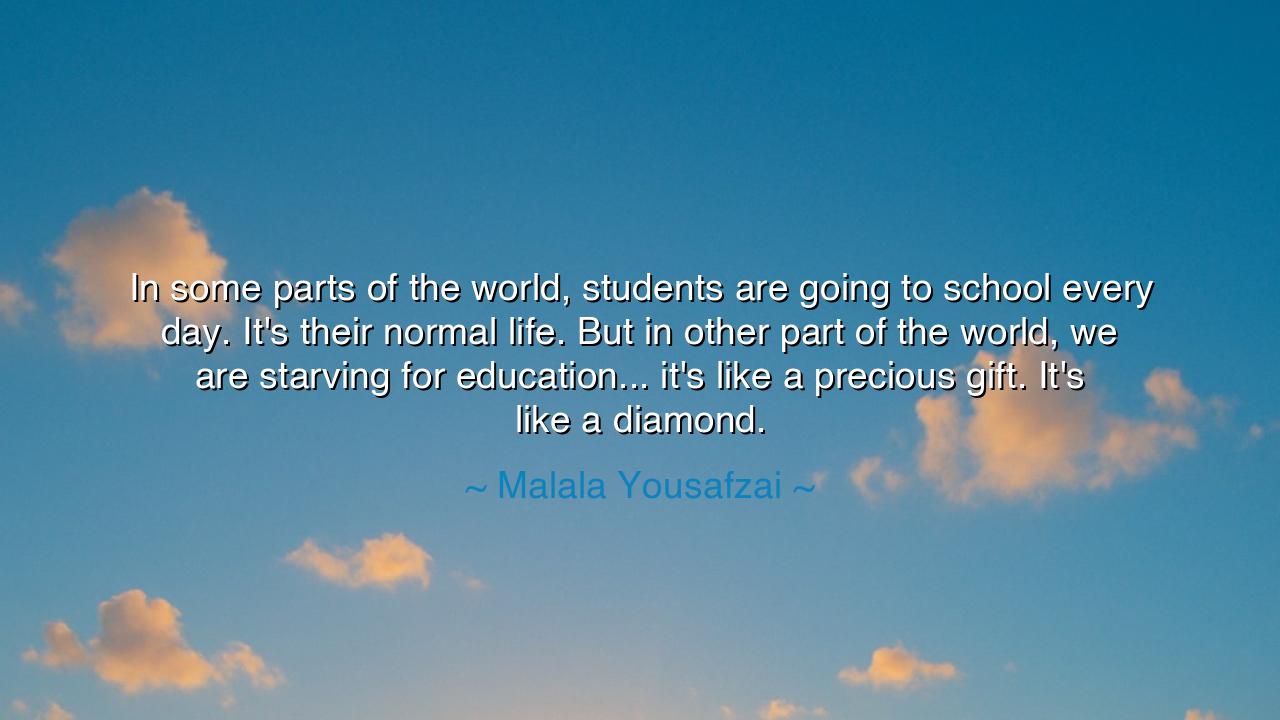
In some parts of the world, students are going to school every
In some parts of the world, students are going to school every day. It's their normal life. But in other part of the world, we are starving for education... it's like a precious gift. It's like a diamond.






Hear, O children of the earth, the voice of Malala Yousafzai, who spoke not only from her lips but from the wounds of her struggle: “In some parts of the world, students are going to school every day. It’s their normal life. But in other parts of the world, we are starving for education... it’s like a precious gift. It’s like a diamond.” In these words lies both lament and revelation. For what many treat as ordinary, others regard as treasure; what is neglected in comfort becomes holy in deprivation.
What is education, if not the bread of the soul, the light in the darkness, the key to both survival and freedom? Yet Malala tells us that this bread, this light, this key, is not given equally. In lands of wealth, children groan under the weight of books, seeing school as duty and burden. But in lands of poverty or oppression, the child gazes at the schoolhouse as one would gaze at a locked temple—longing to enter, knowing that within lies the hope of a different life. There, education is not daily bread but rare banquet; not ordinary water, but a diamond, shining and scarce.
Her words are born of her own story. In the valleys of Pakistan, when the forces of darkness sought to silence girls, Malala defied them. She carried her books as if they were swords, and her pen as if it were a banner of war. For this defiance, she was struck down, yet she rose again, stronger than before, her voice now louder than the guns that sought to silence it. Her life proves the truth of her words: that when education is denied, it becomes more precious than life itself.
History bears witness to the same. Think of Frederick Douglass, born a slave in America, forbidden by law to read and write. He risked punishment and suffering to learn, trading bread for scraps of knowledge, reading in secret as though each word were treasure. Later, he declared that literacy was the pathway from slavery to freedom. To him, as to Malala, education was no routine task—it was liberation, a jewel won through struggle.
The contrast Malala draws is sharp: in one world, education is a habit; in another, it is a miracle. Those who walk daily into classrooms may fail to see the wonder of their fortune, yet those starved of it know its worth more deeply than gold. She calls us to awaken from our slumber of privilege, to recognize the sacredness of what we have, and to remember those who long for it with empty hands and hungry minds.
Beware, then, the sin of indifference. For to treat education lightly is to dishonor those who risk their lives for it. To neglect learning where it is freely offered is to trample upon a diamond as though it were stone. A society that forgets this will soon lose even what it has, for ignorance breeds decay, and complacency prepares the path to ruin.
Therefore, O keepers of tomorrow, let this be your charge: cherish education as the gift it truly is. Approach learning not with weariness but with gratitude, as one who holds a jewel. Support those across the world who hunger for schools, for books, for teachers, as you would feed the starving. Teach your children to value knowledge, and remind them of those who would give their lives for the chance they already possess.
The final word is this: as Malala has spoken, education is a diamond—precious, rare, unbreakable, and capable of cutting through the hardest chains of oppression. Treat it as treasure, guard it with reverence, and extend it to all. For in every child who receives this gift lies the hope of a brighter, freer, nobler world.






AAdministratorAdministrator
Welcome, honored guests. Please leave a comment, we will respond soon